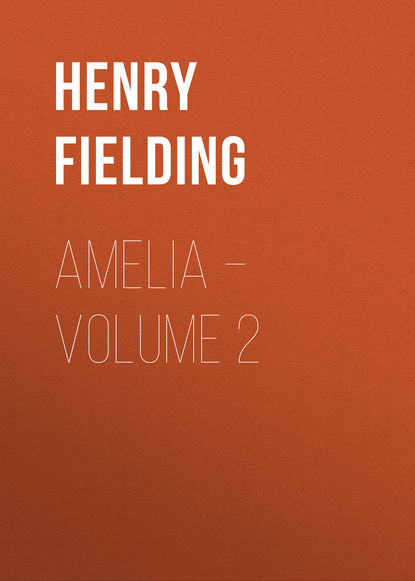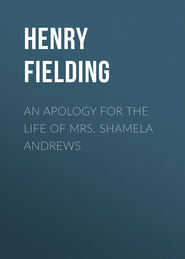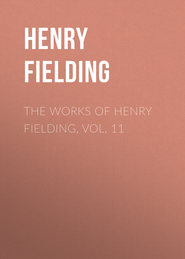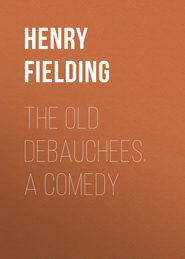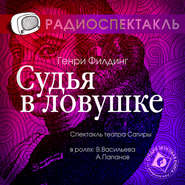По всем вопросам обращайтесь на: info@litportal.ru
(©) 2003-2024.
✖
Amelia – Volume 2
Настройки чтения
Размер шрифта
Высота строк
Поля
In the afternoon Amelia sent to invite Mrs. Ellison to a dish of tea; and Booth undertook to laugh off all that had passed yesterday, in which attempt the abundant good humour of that lady gave him great hopes of success.
Mrs. Bennet came that afternoon to make a visit, and was almost an hour with Booth and Amelia before the entry of Mrs. Ellison.
Mr. Booth had hitherto rather disliked this young lady, and had wondered at the pleasure which Amelia declared she took in her company. This afternoon, however, he changed his opinion, and liked her almost as much as his wife had done. She did indeed behave at this time with more than ordinary gaiety; and good humour gave a glow to her countenance that set off her features, which were very pretty, to the best advantage, and lessened the deadness that had usually appeared in her complexion.
But if Booth was now pleased with Mrs. Bennet, Amelia was still more pleased with her than ever. For, when their discourse turned on love, Amelia discovered that her new friend had all the same sentiments on that subject with herself. In the course of their conversation Booth gave Mrs. Bennet a hint of wishing her a good husband, upon which both the ladies declaimed against second marriages with equal vehemence.
Upon this occasion Booth and his wife discovered a talent in their visitant to which they had been before entirely strangers, and for which they both greatly admired her, and this was, that the lady was a good scholar, in which, indeed, she had the advantage of poor Amelia, whose reading was confined to English plays and poetry; besides which, I think she had conversed only with the divinity of the great and learned Dr Barrow, and with the histories of the excellent Bishop Burnet.
Amelia delivered herself on the subject of second marriages with much eloquence and great good sense; but when Mrs. Bennet came to give her opinion she spoke in the following manner: "I shall not enter into the question concerning the legality of bigamy. Our laws certainly allow it, and so, I think, doth our religion. We are now debating only on the decency of it, and in this light I own myself as strenuous an advocate against it as any Roman matron would have been in those ages of the commonwealth when it was held to be infamous. For my own part, how great a paradox soever my opinion may seem, I solemnly declare, I see but little difference between having two husbands at one time and at several times; and of this I am very confident, that the same degree of love for a first husband which preserves a woman in the one case will preserve her in the other. There is one argument which I scarce know how to deliver before you, sir; but – if a woman hath lived with her first husband without having children, I think it unpardonable in her to carry barrenness into a second family. On the contrary, if she hath children by her first husband, to give them a second father is still more unpardonable."
"But suppose, madam," cries Booth, interrupting her with a smile, "she should have had children by her first husband, and have lost them?"
"That is a case," answered she, with a sigh, "which I did not desire to think of, and I must own it the most favourable light in which a second marriage can be seen. But the Scriptures, as Petrarch observes, rather suffer them than commend them; and St Jerom speaks against them with the utmost bitterness." – "I remember," cries Booth (who was willing either to shew his learning, or to draw out the lady's), "a very wise law of Charondas, the famous lawgiver of Thurium, by which men who married a second time were removed from all public councils; for it was scarce reasonable to suppose that he who was so great a fool in his own family should be wise in public affairs. And though second marriages were permitted among the Romans, yet they were at the same time discouraged, and those Roman widows who refused them were held in high esteem, and honoured with what Valerius Maximus calls the Corona Pudicitiae. In the noble family of Camilli there was not, in many ages, a single instance of this, which Martial calls adultery:
Quae toties nubit, non nubit; adultera lege est."
"True, sir," says Mrs. Bennet, "and Virgil calls this a violation of chastity, and makes Dido speak of it with the utmost detestation:
Sed mihi vel Tellus optem prius ima dehiscat
Vel Pater omnipotens adigat me fulmine ad umbras,
Pallentes umbras Erebi, noctemque profundam,
Ante, fudor, quam te violo, aut tua jura resolvo.
Ille meos, primum qui me sibi junxit, amores,
Ille habeat semper secum, servetque Sepulchro."
She repeated these lines with so strong an emphasis, that she almost frightened Amelia out of her wits, and not a little staggered Booth, who was himself no contemptible scholar. He expressed great admiration of the lady's learning; upon which she said it was all the fortune given her by her father, and all the dower left her by her husband; "and sometimes," said she, "I am inclined to think I enjoy more pleasure from it than if they had bestowed on me what the world would in general call more valuable." – She then took occasion, from the surprize which Booth had affected to conceive at her repeating Latin with so good a grace, to comment on that great absurdity (for so she termed it) of excluding women from learning; for which they were equally qualified with the men, and in which so many had made so notable a proficiency; for a proof of which she mentioned Madam Dacier, and many others.
Though both Booth and Amelia outwardly concurred with her sentiments, it may be a question whether they did not assent rather out of complaisance than from their real judgment.
Chapter viii.
Containing some unaccountable behaviour in Mrs. Ellison
Mrs. Ellison made her entrance at the end of the preceding discourse. At her first appearance she put on an unusual degree of formality and reserve; but when Amelia had acquainted her that she designed to accept the favour intended her, she soon began to alter the gravity of her muscles, and presently fell in with that ridicule which Booth thought proper to throw on his yesterday's behaviour.
The conversation now became very lively and pleasant, in which Booth having mentioned the discourse that passed in the last chapter, and having greatly complimented Mrs. Bennet's speech on that occasion, Mrs. Ellison, who was as strenuous an advocate on the other side, began to rally that lady extremely, declaring it was a certain sign she intended to marry again soon. "Married ladies," cries she, "I believe, sometimes think themselves in earnest in such declarations, though they are oftener perhaps meant as compliments to their husbands; but, when widows exclaim loudly against second marriages, I would always lay a wager that the man, if not the wedding-day, is absolutely fixed on."
Mrs. Bennet made very little answer to this sarcasm. Indeed, she had scarce opened her lips from the time of Mrs. Ellison's coming into the room, and had grown particularly grave at the mention of the masquerade. Amelia imputed this to her being left out of the party, a matter which is often no small mortification to human pride, and in a whisper asked Mrs. Ellison if she could not procure a third ticket, to which she received an absolute negative.
During the whole time of Mrs. Bennet's stay, which was above an hour afterwards, she remained perfectly silent, and looked extremely melancholy. This made Amelia very uneasy, as she concluded she had guessed the cause of her vexation. In which opinion she was the more confirmed from certain looks of no very pleasant kind which Mrs. Bennet now and then cast on Mrs. Ellison, and the more than ordinary concern that appeared in the former lady's countenance whenever the masquerade was mentioned, and which; unfortunately, was the principal topic of their discourse; for Mrs. Ellison gave a very elaborate description of the extreme beauty of the place and elegance of the diversion.
When Mrs. Bennet was departed, Amelia could not help again soliciting Mrs. Ellison for another ticket, declaring she was certain Mrs. Bennet had a great inclination to go with them; but Mrs. Ellison again excused herself from asking it of his lordship. "Besides, madam," says she, "if I would go thither with Mrs. Bennet, which, I own to you, I don't chuse, as she is a person whom nobody knows, I very much doubt whether she herself would like it; for she is a woman of a very unaccountable turn. All her delight lies in books; and as for public diversions, I have heard her often declare her abhorrence of them."
"What then," said Amelia, "could occasion all that gravity from the moment the masquerade was mentioned?"
"As to that," answered the other, "there is no guessing. You have seen her altogether as grave before now. She hath had these fits of gravity at times ever since the death of her husband."
"Poor creature!" cries Amelia; "I heartily pity her, for she must certainly suffer a great deal on these occasions. I declare I have taken a strange fancy to her."
"Perhaps you would not like her so well if you knew her thoroughly," answered Mrs. Ellison. – "She is, upon the whole, but of a whimsical temper; and, if you will take my opinion, you should not cultivate too much intimacy with her. I know you will never mention what I say; but she is like some pictures, which please best at a distance."
Amelia did not seem to agree with these sentiments, and she greatly importuned Mrs. Ellison to be more explicit, but to no purpose; she continued to give only dark hints to Mrs. Bennet's disadvantage; and, if ever she let drop something a little too harsh, she failed not immediately to contradict herself by throwing some gentle commendations into the other scale; so that her conduct appeared utterly unaccountable to Amelia, and, upon the whole, she knew not whether to conclude Mrs. Ellison to be a friend or enemy to Mrs. Bennet.
During this latter conversation Booth was not in the room, for he had been summoned down-stairs by the serjeant, who came to him with news from Murphy, whom he had met that evening, and who assured the serjeant that, if he was desirous of recovering the debt which he had before pretended to have on Booth, he might shortly have an opportunity, for that there was to be a very strong petition to the board the next time they sat. Murphy said further that he need not fear having his money, for that, to his certain knowledge, the captain had several things of great value, and even his children had gold watches.
This greatly alarmed Booth, and still more when the serjeant reported to him, from Murphy, that all these things had been seen in his possession within a day last past. He now plainly perceived, as he thought, that Murphy himself, or one of his emissaries, had been the supposed madman; and he now very well accounted to himself, in his own mind, for all that had happened, conceiving that the design was to examine into the state of his effects, and to try whether it was worth his creditors' while to plunder him by law.
At his return to his apartment he communicated what he had heard to Amelia and Mrs. Ellison, not disguising his apprehensions of the enemy's intentions; but Mrs. Ellison endeavoured to laugh him out of his fears, calling him faint-hearted, and assuring him he might depend on her lawyer. "Till you hear from him," said she, "you may rest entirely contented: for, take my word for it, no danger can happen to you of which you will not be timely apprized by him. And as for the fellow that had the impudence to come into your room, if he was sent on such an errand as you mention, I heartily wish I had been at home; I would have secured him safe with a constable, and have carried him directly before justice Thresher. I know the justice is an enemy to bailiffs on his own account."
This heartening speech a little roused the courage of Booth, and somewhat comforted Amelia, though the spirits of both had been too much hurried to suffer them either to give or receive much entertainment that evening; which Mrs. Ellison perceiving soon took her leave, and left this unhappy couple to seek relief from sleep, that powerful friend to the distrest, though, like other powerful friends, he is not always ready to give his assistance to those who want it most.
Chapter ix.
Containing a very strange incident
When the husband and wife were alone they again talked over the news which the serjeant had brought; on which occasion Amelia did all she could to conceal her own fears, and to quiet those of her husband. At last she turned the conversation to another subject, and poor Mrs. Bennet was brought on the carpet. "I should be sorry," cries Amelia, "to find I had conceived an affection for a bad woman; and yet I begin to fear Mrs. Ellison knows something of her more than she cares to discover; why else should she be unwilling to be seen with her in public? Besides, I have observed that Mrs. Ellison hath been always backward to introduce her to me, nor would ever bring her to my apartment, though I have often desired her. Nay, she hath given me frequent hints not to cultivate the acquaintance. What do you think, my dear? I should be very sorry to contract an intimacy with a wicked person."
"Nay, my dear," cries Booth. "I know no more of her, nor indeed hardly so much as yourself. But this I think, that if Mrs. Ellison knows any reason why she should not have introduced Mrs. Bennet into your company, she was very much in the wrong in introducing her into it."
In discourses of this kind they past the remainder of the evening. In the morning Booth rose early, and, going down-stairs, received from little Betty a sealed note, which contained the following words:
Beware, beware, beware;
For I apprehend a dreadful snare
Is laid for virtuous innocence,
Under a friend's false pretence.
Booth immediately enquired of the girl who brought this note? and was told it came by a chair-man, who, having delivered it, departed without saying a word.
He was extremely staggered at what he read, and presently referred the advice to the same affair on which he had received those hints from Atkinson the preceding evening; but when he came to consider the words more maturely he could not so well reconcile the two last lines of this poetical epistle, if it may be so called, with any danger which the law gave him reason to apprehend. Mr. Murphy and his gang could not well be said to attack either his innocence or virtue; nor did they attack him under any colour or pretence of friendship.
After much deliberation on this matter a very strange suspicion came into his head; and this was, that he was betrayed by Mrs. Ellison. He had, for some time, conceived no very high opinion of that good gentlewoman, and he now began to suspect that she was bribed to betray him. By this means he thought he could best account for the strange appearance of the supposed madman. And when this conceit once had birth in his mind, several circumstances nourished and improved it. Among these were her jocose behaviour and raillery on that occasion, and her attempt to ridicule his fears from the message which the serjeant had brought him.
This suspicion was indeed preposterous, and not at all warranted by, or even consistent with, the character and whole behaviour of Mrs. Ellison, but it was the only one which at that time suggested itself to his mind; and, however blameable it might be, it was certainly not unnatural in him to entertain it; for so great a torment is anxiety to the human mind, that we always endeavour to relieve ourselves from it by guesses, however doubtful or uncertain; on all which occasions, dislike and hatred are the surest guides to lead our suspicion to its object.
When Amelia rose to breakfast, Booth produced the note which he had received, saying, "My dear, you have so often blamed me for keeping secrets from you, and I have so often, indeed, endeavoured to conceal secrets of this kind from you with such ill success, that I think I shall never more attempt it." Amelia read the letter hastily, and seemed not a little discomposed; then, turning to Booth with a very disconsolate countenance, she said, "Sure fortune takes a delight in terrifying us! what can be the meaning of this?" Then, fixing her eyes attentively on the paper, she perused it for some time, till Booth cried, "How is it possible, my Emily, you can read such stuff patiently? the verses are certainly as bad as ever were written." – "I was trying, my dear," answered she, "to recollect the hand; for I will take my oath I have seen it before, and that very lately;" and suddenly she cried out, with great emotion, "I remember it perfectly now; it is Mrs. Bennet's hand. Mrs. Ellison shewed me a letter from her but a day or two ago. It is a very remarkable hand, and I am positive it is hers."
"If it be hers," cries Booth, "what can she possibly mean by the latter part of her caution? sure Mrs. Ellison hath no intention to betray us."
"I know not what she means," answered Amelia, "but I am resolved to know immediately, for I am certain of the hand. By the greatest luck in the world, she told me yesterday where her lodgings were, when she pressed me exceedingly to come and see her. She lives but a very few doors from us, and I will go to her this moment."
Booth made not the least objection to his wife's design. His curiosity was, indeed, as great as hers, and so was his impatience to satisfy it, though he mentioned not this his impatience to Amelia; and perhaps it had been well for him if he had.
Amelia, therefore, presently equipped herself in her walking dress, and, leaving her children to the care of her husband, made all possible haste to Mrs. Bennet's lodgings.
Amelia waited near five minutes at Mrs. Bennet's door before any one came to open it; at length a maid servant appeared, who, being asked if Mrs. Bennet was at home, answered, with some confusion in her countenance, that she did not know; "but, madam," said she, "if you will send up your name, I will go and see." Amelia then told her name, and the wench, after staying a considerable time, returned and acquainted her that Mrs. Bennet was at home. She was then ushered into a parlour and told that the lady would wait on her presently.
In this parlour Amelia cooled her heels, as the phrase is, near a quarter of an hour. She seemed, indeed, at this time, in the miserable situation of one of those poor wretches who make their morning visits to the great to solicit favours, or perhaps to solicit the payment of a debt, for both are alike treated as beggars, and the latter sometimes considered as the more troublesome beggars of the two.





